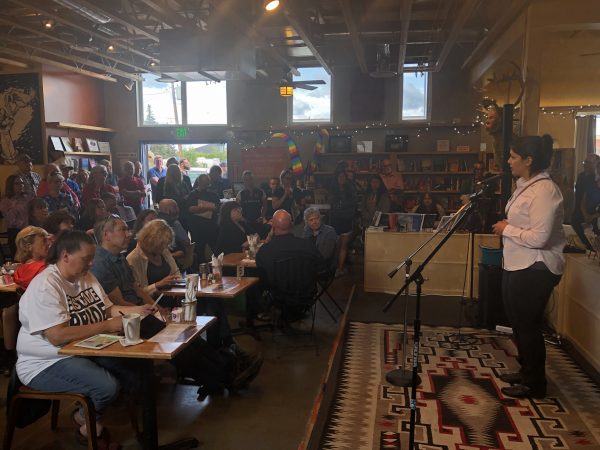
A group of about 100 Alaskans unhappy with Gov. Mike Dunleavy met at an Anchorage bookstore Monday to discuss launching a recall campaign.
“There’s a lot of remorse — buyer’s remorse,” Meda DeWitt, a spokesperson for the effort, said before the event.
The event was originally intended to kick off the signature-gathering effort, which is being organized by a group now calling themselves “Recall Michael J. Dunleavy.”
But organizers put the official recall launch on hold until August 1, due to “overwhelming public interest,” according to the press release. And, according to co-organizer Nathaniel Markowitz, they need more time to legally vet the statement in the application describing why they want a recall, which is limited to 200 words.
“We have no doubt that this is going to result in a legal fight, so it’s a matter of winnowing that statement of grounds down to our strongest 200 words,” Markowitz said.
DeWitt said there is also the matter of coming to a consensus.
“Now that we’ve come out in the public, there’s other recall efforts around the state who are coming forward as well, who, as we’re coming together as a group, would like to review it,” DeWitt said.
Under Alaska statute, the grounds for a recall are lack of fitness, incompetence, neglect of duties or corruption.
At the event, organizers said the governor’s budget vetoes are not the sole reason they want to pursue a recall. But the vetoes were cited repeatedly.
“This is a ruinous, economically devastating set of vetoes that this governor has handed down,” Mike Mason, another one of the co-organizers, told the crowd.
A political action committee called Future North registered with the state in February and is backing the recall effort. Its fundraising website reports raising about $6,900.
Aside from needing a solid legal case, organizers must jump through several more hoops before a recall can move forward.
To apply, they must collect 28,501 signatures, or 10 percent of the number of voters in the last general election. To actually hold a recall, they would then need signatures from 25 percent of the number of voters in the last general election — that’s 71,252 signatures.
Democratic Rep. Harriet Drummond, from Anchorage, attended the event and said she was planning on signing on.
“It’s so frustrating because we’re back to square one, we’re back to where we were on February 13 when he presented his budget for the first time,” Drummond said.
Drummond did not say that she and and other Alaska lawmakers opposed to Dunleavy were discussing assisting the recall effort.
“I haven’t really talked with colleagues about it, but I wouldn’t be surprised if most of them signed up” she said.




